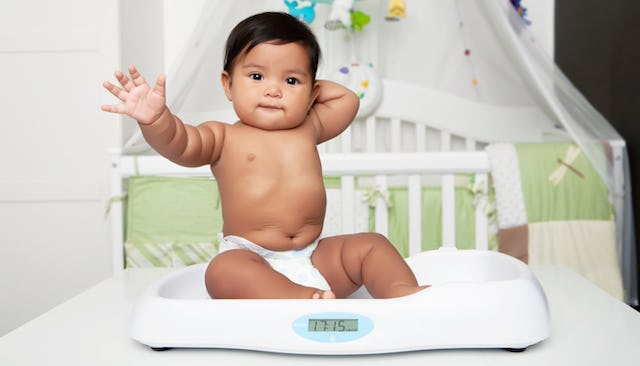Don't Worry Pregnant Moms, Your Baby Probably Isn't As Huge As Your Doc Says It Is

Doctors might be warning too many women that they’re having a “big baby.”
As an expectant mom, you get used to hearing wonky baby weight estimates as you approach the final weeks of pregnancy, but some new research shows doctors might be better off not getting women worked up about the size of their little bundles.
The research is published in the December issue of Maternal And Child Health Journal, and it suggests many doctors are vastly overestimating the number of women who are pregnant with large babies. For the findings, researchers looked at a survey of 2,400 women who had babies between 2011 and 2012. Nearly a third of the women reported being told by their doctor that they were expecting a large baby, but only about nine percent of them ended up birthing a baby larger than 8 pounds, 13 ounces.
While overestimating a baby’s weight isn’t a huge deal on its own, researchers also found that women who were told they were expecting large babies became more likely to request interventions, like an early induction or a C-section. According to Erika Cheng, an assistant professor of pediatrics at Indiana University and an author on the study, it’s possible that “telling mothers their baby might be large could undermine their confidence that they can deliver their baby.” After all, no one likes thinking their vagina might be obliterated during labor and delivery.
Weight estimates are fairly unreliable — according to these researchers, they can be off by as much as 20 percent — and most of us know that. The thing is, it’s hard to know when you should worry and when you shouldn’t. I was told both of my children were measuring above average, as were a lot other moms I know. None of us ended up having huge babies, but it’s not difficult to imagine a first-time mom opting for a C-section or delivering early because she’s given an incorrect weight estimate and doesn’t know exactly what to do with the information.
Doctors aren’t purposely trying to scare us, and in all likelihood they just want women to know what the options are if their babies are exceptionally large. It’s just that too often women are leaving their appointments thinking it’s a fact that their babies are huge, when really it’s more like an educated guess. Some doctors do a great job educating their patients and explaining exactly what the numbers mean, but that’s not true across the board. Unless there’s a pressing issue, it seems like a bad move to caution women that we might, in fact, be birthing baby elephants when that’s usually not the case.
It’s annoying enough when people stop us on the street to tell us that our stomachs are too big or too small, that we must be expecting twins, or that we’ve somehow stunted our baby’s growth and they can tell just by looking at us. The last thing we need is a doctor making us think we’re about to birth a gigantic, 25-pound monster infant. Hopefully this study leads to a little bit of a shift in how this information is presented to expectant moms. Otherwise, it’d be cool if they could just let us grow our most likely average-sized newborns in peace.